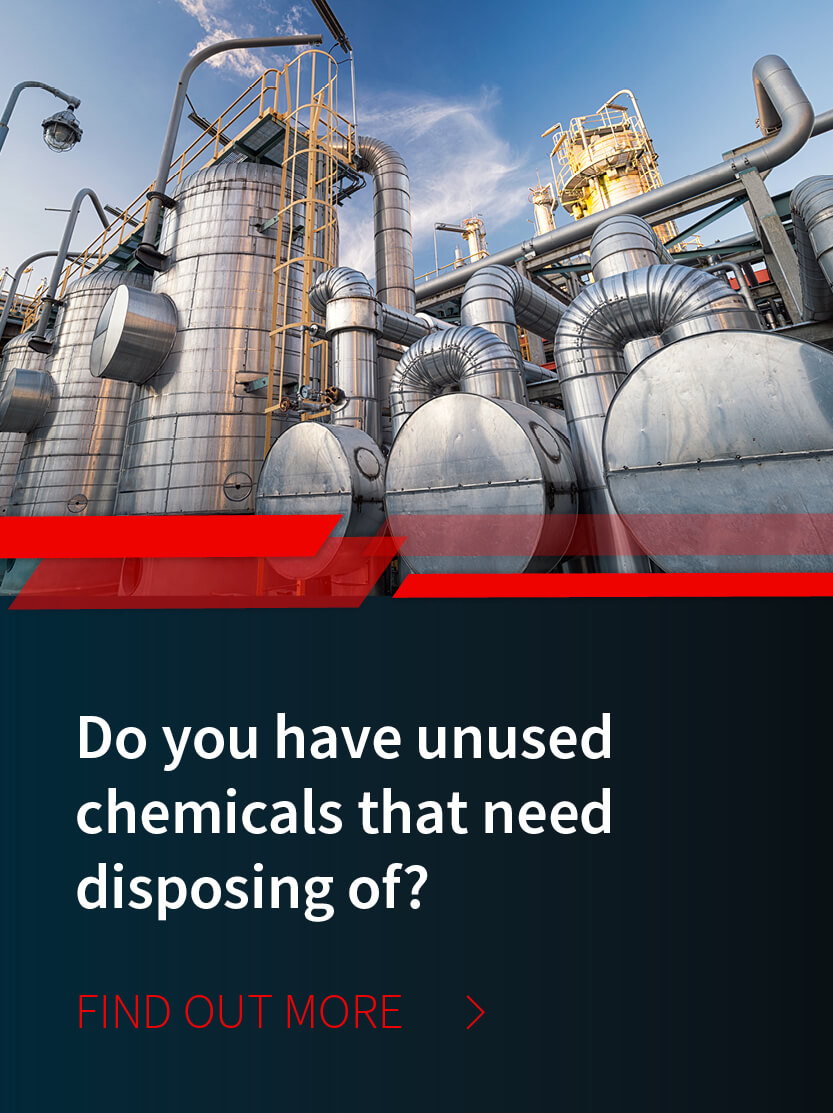
/ IN THIS BLOG
For many businesses, the collection and disposal of industrial waste presents a host of challenges. The byproduct of industrial activities, ranging from manufacturing to electronics and auto repair, industrial waste can include scrap metal, chemicals, universal waste, and a myriad of other potentially toxic compounds.
When mishandled, industrial waste can cause irreparable damage to humans and the environment and expose organizations to legal liability. One way to mitigate risk and ensure proper collection and disposal involves partnering with a qualified waste management company.
01 / When Waste Management Goes Wrong
Industrial waste contamination can occur whenever toxic byproducts find their way into the environment without proper processing and disposal. When dumped into waterways, lakes or oceans or landfills, hazardous materials can release toxins into the environment, disrupting habitats and causing harm to wildlife and humans. Damage to watersheds, air pollution, and contamination of soil are only a few of the dangers of improper industrial waste management.
Since the 1970s, laws have existed that prevent dumping of chemicals and industrial or radioactive wastes into the ocean. Such incidents led to new regulations and their lasting effects are still seen today. Before those regulations were imposed, the amount of industrial waste dumped in the ocean is eye-opening. According to the EPA, 1968 alone saw ocean-dumping practices that amounted to:
-
- 4.5 million tons of industrial waste
- 38 million tons of dredged material (34% polluted)
- 4.5 million tons of sewage sludge (of which much was contaminated with heavy metals)
During the height of the cold war, between 1946 and 1970, nearly 34,000 containers of radioactive waste was dumped off the eastern coastline of the U.S!
Over the past 50 years, the EPA has worked to prevent such harmful materials from being disposed of in our oceans. Today, what does get dumped is primarily non-contaminated sediment from our waterways. Currently, 98 ocean disposal sites of specific and limited materials are overseen by the Marine Protection, Research and Sanctuaries Act (MPRSA).
Waste management infrastructure becomes overburdened when materials eligible for recycling find their way into landfills instead of being reused or repurposed. Just a few negative consequences include but are not limited to:
-
- Contamination of soil and water
- Acids that leak from improper containment and leach into the air and cause air pollution
- Human exposure to toxins that cause respiratory, reproductive, and other health issues
- Negative impact on local wildlife due to feeding on toxic or contaminated waste
- Contact with or spread of diseases such as malaria, dengue, leptospirosis and others caused by foraging mosquitos, rats, mice, and other vermin
- Climate change caused by release of greenhouse gases that trap heat and can lead to warmer climates and more intense storm and erratic weather patterns
The effects of improper disposal of industrial waste include immediate and long term effects. Ocean acidification from contaminated water sources has a great potential to hurt ocean life and lead to a loss of biodiversity.
02 / Know Industrial Waste Regulations
Knowledge of industrial waste regulations not only saves the environment and protects the health of humans and wildlife, but also reduces the risk of massive fines and penalties for non-compliance. Do you know where to find the rules for industrial waste disposal processes?
Start with the EPA’s Guide for Industrial Waste Management found here. This document alone is nearly 500 pages of information that includes:
-
- Characterizing constituents of industrial waste
- Waste minimization
- Fact sheets
- Assessing risks posed by certain wastes
The federal Resource Conservation and Recovery Act (RCRA) provides oversight of hazardous wastes. The EPA also provides resources for state-by-state policies and guidance for all waste streams. As such, every state can also apply for EPA state authorization, which turns over the responsibility of hazardous waste management to the state level.
Yes, it’s a lot of material and regulations to get through, but each and every one of them is important when it comes to industrial and hazardous waste management and disposal processes. The EPA can fine over $72,000 per day, per violation for non-compliant hazardous waste disposal or processes. Don’t take the chance. Consult with a professional waste management company familiar and experienced in hazardous and industrial waste.
03 / Importance of Professional Waste Management
For most organizations, the complexity involved in the collection, transportation, and processing of industrial waste can be overwhelming. With regulations constantly changing, it can be hard to stay on top of all the requirements and protocols. Responsible waste management helps organizations maintain safety in the workplace while also protecting the environment and limiting liability.
Qualified waste management providers can handle all types of disposal services, including industrial waste, and understand the challenges and requirements associated with proper industrial waste disposal, including insurance and regulatory compliance. By outsourcing waste collection, transportation, and disposal to qualified experts, companies can mitigate risk and continue to focus on their core business operations.
04 / Rely on experts
With almost three decades of experience in waste management and disposal, MCF Environmental Services provides the expertise and capabilities you need to properly handle your industrial waste. We provide support and know-how to eliminate challenges that come with waste disposal, providing a proactive, not reactive, approach to waste management for businesses generating industrial or hazardous waste streams.
Spend less time worrying about making mistakes with your industrial or hazardous waste. With decades of experience, MCF Environmental Services can help your business or facility streamline operations and maximize profits. For more information about our products and customizable services, contact us today.
Robert Losurdo
President, COO








